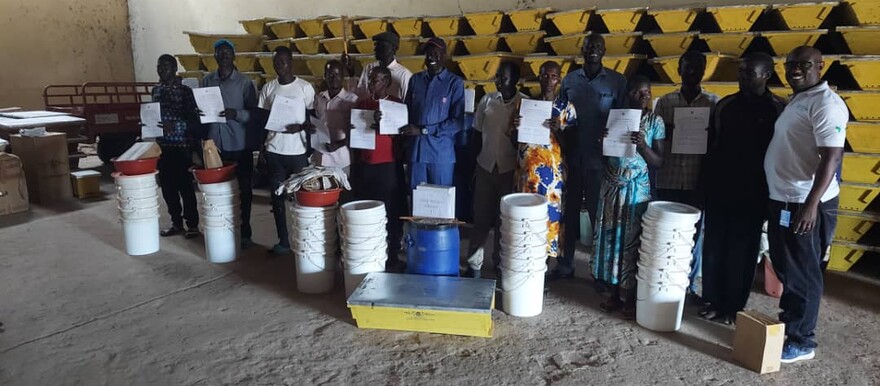In a promising initiative aimed at boosting the beekeeping industry in Wulu County, the United Nations Food and Agriculture Organization (UNFAO), in partnership with the State Ministry of Agriculture in Lakes State, has distributed 500 beehives to 300 beekeepers on Wednesday.
Hannigton Sebaduka, the Head of the UNFAO Field Office in Lakes State, spoke about their collaborative efforts in the honey and shea-nut sectors, expressing gratitude for the support received from the government and people of Norway.
He stated, “Today in Wulu County, we have been working with beekeepers. We have been working with 300 beekeepers, both male and female, in ten groups in the Payams of Makundur, Wulu, Domoloto, and Bargel. In this period, we aim to enhance the capacity of beekeepers in Lakes State, starting with Wulu County. We’ve provided them with 500 beehives, ensuring they receive modern production techniques.”
Each group will receive 50 beehives, and with approximately 30 beekeepers per group, this means that each beekeeper will have access to a modern beehive. Sebaduka highlighted the benefits of these modern kit beehives, saying they have three times the capacity of traditional beehives in terms of productivity and offer value addition opportunities, focusing on maximizing income and producing by-products like wax and pollen.
“We are also providing value production technologies, including 5 extractors, honey warmers, gumboots, plastic bottles, and protection suits. We want to make the honey sector gender-friendly, encouraging women’s participation in beekeeping,” Sebaduka emphasized.
Commissioner Jima Diffala Rejab of Wulu County stressed the need for partner support for the honey and Shea butter factory, along with the proper utilization of equipment. He said, “These items are meant for the factory, not for individuals. No one should own them as personal property.” Jima also mentioned that honey production in Wulu County is affected by seasonal changes, impacting the factory’s quality due to variations in rainfall.
During a visit, he urged UNFAO to provide water points (boreholes) near the factory for drinking water and household use.
John Morik Michang, a trainer of trainees in the honey and beekeeping group and a youth representative, praised the honey and Shea butter factory for helping many youth who struggled to raise funds for marriage. He lauded the introduction of modern beekeeping technology known as Kenya Top Bar, stating, “Kenya Top Bar is very nice because you cannot kill bees, and your honey also will not have the smell of smoke.”
Morik emphasized the importance of not harming bees and the potential for beekeepers in Wulu County to earn more income from selling drones and queens to others in the region.
Mary Sura, a woman representative, expressed the joy and gratitude of the ten groups they are collaborating with towards the UNFAO for initiating the program in Wulu County.
“In the past, we used to boil the honey in traditional saucepans and then had to transfer it to a bucket to cool. However, with the new technology, we can produce honey without boiling it, resulting in clean, dirt-free honey that can be easily transported to any market,” Mary explained.
She went on to emphasize the positive impact of this honey production on Wulu County, stating, “This honey production has brought about significant changes for us in Wulu County. We can now produce honey, which not only generates income but also provides for our children, allowing them to benefit from the money we earn.”
Despite the successes, she voiced a continued appeal to the UNFAO, stressing the need for water points (boreholes) to be provided to beekeepers and the honey production industry, ensuring the local population has access to clean drinking water.




